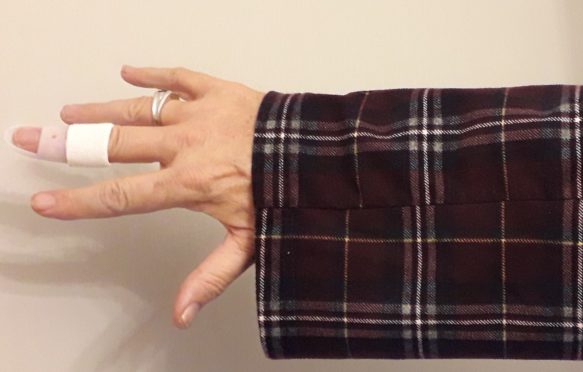I was feeling sorry for myself while nursing a suspected broken finger in casualty.
And it was all because I had fallen out of my pyjamas while trying to rip them off.
I was in our bedroom at the time (just for the record I was trying to get dressed, in case you were wondering). I think most accidents happen in the home; you can bet a lot of them are not only painful, but also excruciatingly embarrassing.
How do medics and reception staff keep a straight face as patients explain bizarre sequences of events which led them to accident and emergency?
I remember making a point of it as two medics examined me when I said, “Don’t laugh, but I fell out of my pyjamas.” As the laughter died away, it reminded me that humour is essential medicine in hospital – for staff and patients. Even in darkest situations humour always forces its way through.
They were a jolly lot at casualty reception as I checked in. A friendly receptionist said, “You’ll have about an hour’s wait, but it could be busy later because it’s Halloween.” Oh no, I thought, I was not in the mood for people cloaked as Count Dracula coming in with fangs embedded in their necks for real. My worry, though, was if a bunch of injured ghouls required treatment I might slip further down the queue.
It’s not like the barbers where everyone knows where they stand in the pecking order. In casualty far more important cases can slip in unnoticed around the back on stretchers, so we walking wounded have to wait – quite rightly. But who would be the more urgent case: a man who had a pumpkin fall on his head or another who fell out of his pyjamas?
I wondered whether I should bring a sleeping bag, but an hour seemed fair enough especially as an official sign said their gold standard was to see you in under four (it was almost two in the end). It was quite nice in the large modern waiting area, with a cafe and vending machines close by. I am now a connoisseur of NHS catering facilities in Aberdeen and I like the branded coffee they sell.
Luckily, it was only 5.30pm. I dread to think what it’s like here at midnight at weekends – an image of the “red wedding” massacre from Game of Thrones swam into my imagination.
Some older men buy Harley-Davidsons; I bought a set of slim-fit pyjamas to relive my youth. They’re fine for a young man, but not a mature less-supple gentleman.
I’ve had a few close shaves trying to get them off. The trouble is that I have to tug hard from the bottom, while wobbling on the other foot, due to the “drainpipe effect” of them clinging tight to my legs like someone from a ballet class for seniors.
This time my luck ran out. I slipped and my full not-unsubstantial weight collapsed on top of my extended right-hand middle fingertip, which was balancing me on the carpet.
There was an awful loud snapping noise and I am sure a crow on our garden wall about 20 yards away heard it, too. It was scrutinising me in the same way I look at a plate of bacon and eggs. In a flash I recalled how I could not bring myself to look at one of my thumbs a while ago, straight after I slammed my car door on it at a petrol pump, because I feared I had chopped it off
Plucking up courage, I brought my middle finger into view and discovered it was pointing in the wrong direction – downwards at a sickly angle. Forlornly I thought it might spring back on its own, but I was ordered to hospital by my excellent GP after describing my predicament to her by phone. Now I was focusing hard on my bent finger while holding it up in hospital. The blurry background came into focus – and a notice on the wall warning about the perils of something called “Pyjama Paralysis”.
Oh no, I thought, I have a terrible incurable affliction caused by pyjamas. But I looked closer and saw it was only a reminder for in-patients to bring a variety of clothes, and not rely on pyjamas alone.
Finally, the diagnosis: it was not broken, but I had “mallet finger” caused by a torn tendon. I don’t know how it got its name, but I suspect it was because my finger looked like it had been smashed with a mallet.
Now it’s in a splint. Do you know splints have been in use since ancient times? Greek “father of medicine” Hippocrates also invented one. There was a “Tobruk Splint” in WWII to ease the agony of wounded troops in transit over rough terrain.
Now I’ve found how difficult it is to adapt after temporarily losing the use of just one finger in my preferred hand. Poor me. It made me think of others with far more serious disabilities who have to make dramatic adjustments to their lives permanently.
I am stuck in this splint for three months – that wiped the smile off my face.
David Knight is the long-serving former deputy editor of the Press and Journal

